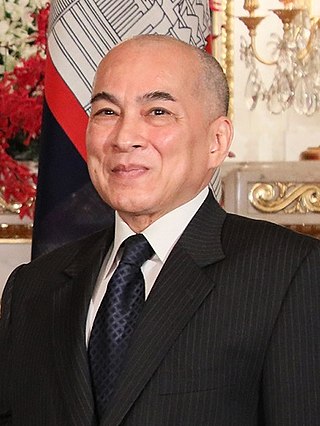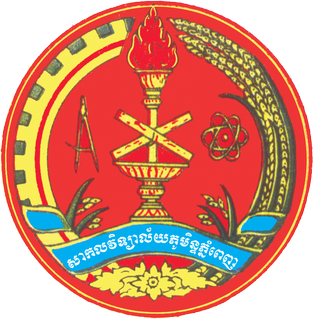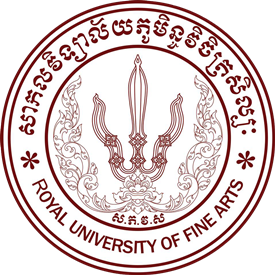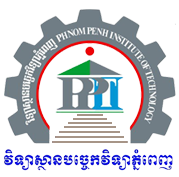
The system of transport in Cambodia, rudimentary at the best of times, was severely damaged in the chaos that engulfed the nation in the latter half of the 20th century. The country's weak transport infrastructure hindered emergency relief efforts, exacerbating the logistical issues of procurement of supplies in general and their distribution. Cambodia received Soviet technical assistance and equipment to support the maintenance of the transportation network.

Phnom Penh is the capital and most populous city of Cambodia. It has been the national capital since the French protectorate of Cambodia and has grown to become the nation's primate city and its economic, industrial, and cultural centre. Before Phnom Penh became capital city, Oudong was the capital of the country.

Norodom Sihanouk was a member of the Cambodian royal house who led the country as King and Prime Minister. In Cambodia, he is known as Samdech Euv. During his lifetime, Cambodia was under various regimes, from French colonial rule, a Japanese puppet state (1945), an independent kingdom (1953–1970), a military republic (1970–1975), the Khmer Rouge regime (1975–1979), a Vietnamese-backed communist regime (1979–1989), a transitional communist regime (1989–1993) to eventually another kingdom.
Articles related to Cambodia and Cambodian culture include:

Phnom Penh International Airport, formerly Pochentong International Airport, is the busiest international airport in Cambodia and serves as the country's main international gateway. It is Cambodia's second largest airport by area after the new Siem Reap–Angkor International Airport. It is located in the Pou Senchey District, 10 kilometres (5.4 NM) west of Phnom Penh, the nation's capital.

Norodom Sihamoni is King of Cambodia. He became King on 14 October 2004, a week after the abdication of his father, Norodom Sihanouk.

The Royal Palace of Cambodia is a complex of buildings which serves as the official royal residence of the King of Cambodia. Its full name in Khmer is the Preah Barom Reacheaveang Chaktomuk Serey Mongkol. The Cambodian monarchs have occupied it since it was built in the 1860s, with a period of absence when the country came into turmoil during and after the reign of the Khmer Rouge.
Battambang is the capital of Battambang Province and the third largest city in Cambodia.

The National Museum of Cambodia is Cambodia's largest museum of cultural history and is the country's leading historical and archaeological museum. It is located in Chey Chumneas, Phnom Penh.

The Royal University of Phnom Penh is a national research university of Cambodia, located in the Phnom Penh capital. Established in 1960, it is the country's largest university. It hosts around 30,000 students in undergraduate and postgraduate programmes. It offers degrees in fields such as sciences, humanities and social sciences,environment, engineering as well as vocational courses in fields such as information technology, electronics, psychology and tourism. RUPP provides Cambodia's foremost degree-level language programmes through the Institute of Foreign Languages. RUPP has full membership in the ASEAN University Network (AUN).

Vann Molyvann was a Cambodian architect and urban planner. Molyvann is best known as pioneering the style known as New Khmer Architecture, which combined modernism and Khmer tradition, and accounted for the country's unique environment and irrigation needs.

The Royal University of Arts is a university in Chey Chumneas, Phnom Penh specialising in architecture and fine arts. It is the oldest university in Cambodia, having been in existence since 1917. It is part of Pnom International School including Angkor, Invictus, Paragon and AUPP.

Russey Keo, also spelled as Russei Keo, is a district (khan) in Phnom Penh, Cambodia. This district consists of the northern and north-eastern outskirts of the main city of Phnom Penh, stretching from Khan Sen Sok in the west to the Tonlé Sap River in the east. As of 2019, it is the most populous district of Phnom Penh.

The Royal University of Agriculture (RUA) is a leading public agricultural university in Cambodia. It is located in Dangkao Section, southwest Phnom Penh. The university is operated by the Ministry of Agriculture, Forestry and Fisheries.

Christ the King Cathedral, also known as the Cathedral of Phnom Penh, was a 19th-century French Gothic revival church that served as the cathedral of the Apostolic Vicariate of Phnom Penh. It was located in the Russei Keo District of the city on Monivong Boulevard.

The Phnom Penh Institute of Technology is a national top-tier research university in Phnom Penh, Cambodia. PPIT is the largest private institution for higher education in Cambodia dedicated to science technology and engineering. PPIT enrolled 246 undergraduates students in 2012–2013. It employs around 21 faculty members.
The following lists events that happened during 1975 in Cambodia.
Khin Sok was a Cambodian historian, linguist, literature and arts scholar. He acquired a doctorate of history in Paris, published scientific works, taught as a professor in the Royal University of Phnom Penh and was a member of the Royal Academy of Cambodia. His publications during the second half of the 20th century profoundly contributed to the scientific interpretation of historical sources, literature and the systemic development of the modern Khmer language. As a participant of the Khmerization movement he encouraged the promotion of a culturally independent Cambodia on the basis of enlightened and scholarly education in an international context.
Long Seam or Long Siem is a Cambodian historian and linguist and specialist of Khmer epigraphy, who was known as "the man who could talk to stones" and is considered the second greatest scholar in Cambodian history after the late Chuon Nath.
Venerable Pang Khat also known as Bhikkhu Viriyapandito was a Cambodian Theravada bikkhu monk who was notorious from 1940 to 1975 and who is most famous for his translations from Sanskrit language to Khmer.














